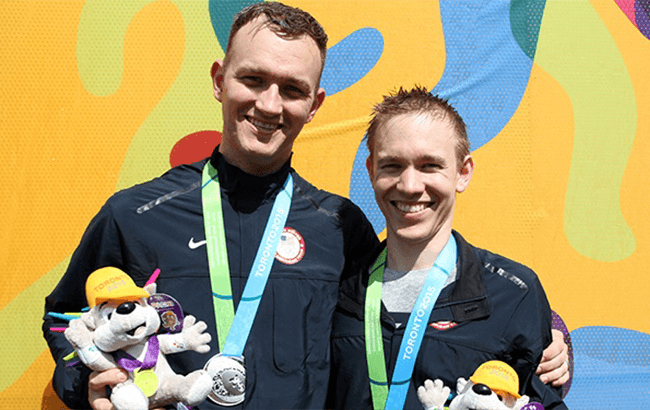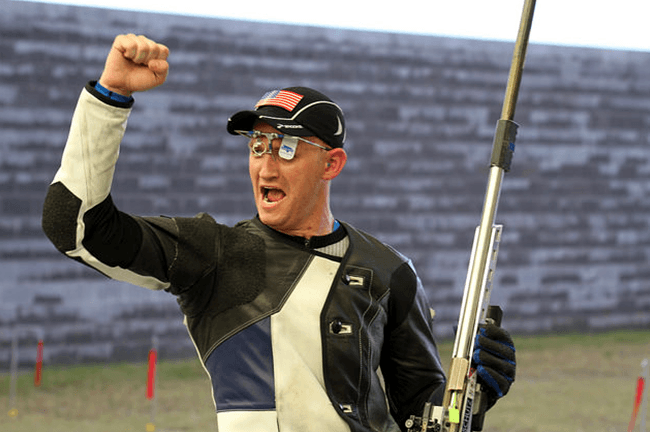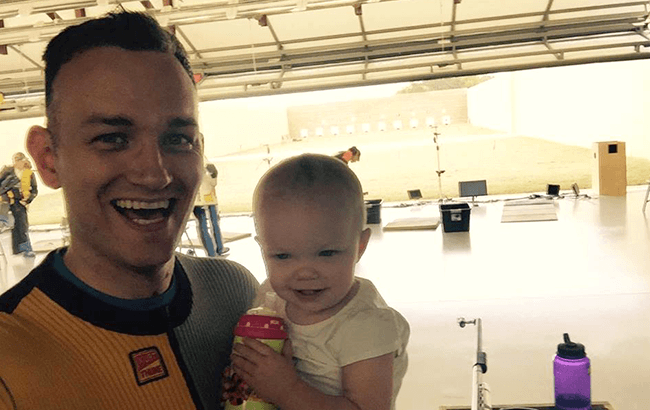George Norton — Breaking the Rifle Athlete Mold
“Jokes and small-bore — that’s what I do!” says George Norton proudly during one of the Olympic Team Trials matches.
And he’s really not that far off. You can easily spot the tall, lanky, Army Marksmanship Unit rifle shooter at any match. He’s the one pumping his fist in the air with the wide, agape smile after a win, laughing with his teammates off the range or creating memes for his Facebook page.
“Hey, I’m building a brand here!” he explains jokingly. “I know I don’t really fit the mold, but you can have fun at this and not be a robot. In a sport where everything can be so boring, you’ve got to have those guys like [Michael] McPhail who isn’t just a shooter. When everyone thinks of him, they might think of this tough, hard-working mean guy, but he has a big personality. Sarah Beard? She’s one of the nicest people you’d meet in the world, but you see her on the line and she’s a fierce competitor. Then you’ve got someone like me who’s kind of the jester. It’s nice to find those personalities in a sport that is just not meant to have personality — you’re told not to think, not to do these things, but you just can’t be like that.”
Tough Beginnings
But life wasn’t always like, well, this for Norton.
“I was bullied really badly growing up,” he said. “My parents were kind of at each other’s throats after they got divorced, I was just kind of acting out and joining whatever crowd would accept me. I wasn’t really going anywhere, and that’s when my mom took me to St. John’s Military School in Salina, Kansas. I was a sophomore in high school. I don’t know what path I would have ended up on if I had not gone there, but it wouldn’t have been a good one.”
While at St. John’s, Norton’s roommate wanted to try out for the rifle team, but didn’t want to go alone.
“I had never shot before — I thought it was the dumbest idea,” Norton said. “He ended up signing me up for it anyway since he and I were kind of attached at the hip.
“The tryout starts, I was signed up and I’m not there, and I hear my name over the loudspeaker in the barracks because I’m not there and the coach comes up and is like, ‘Did you want to do this?’ and I’m like, ‘I’m pretty sure my roommate signed me up for it.’ He said if I wanted to, I could still do it. I ended up shooting really well, and then they offered me a spot on the team. I asked my mom if it was okay and she said, ‘Yeah, you’re in military school, do it.’ It all started there at St. Johns. I owe them everything.”
A Career in Shooting
From there, he threw himself into rifle shooting throughout his college career and eventually entering the AMU.
“Once I got that job [in AMU], everything got turned on,” he said. “All of these people in my life from St. John’s forward have done so much for me — all the things my wife has done, Rick Hawkins giving me a tryout to be on the Army team, I had no choice but to be good at it. It’s not like a pressure thing, but it’s now like I’ve been able to find something that I’m good at without all of the negative distractions of things that were in the way growing up.”
He didn’t take that responsibility lightly as he entered the Pan American Games, where he won a silver medal and the lone U.S. quota in Men’s Three-Position Rifle.

George Norton and Ryan Anderson pose for a photo after winning silver and bronze in the men’s 50-meter rifle 3-position at the Toronto 2015 Pan American Games.
“At the end [of the Pan American games] I looked at the monitor after the final shot and I was in second and I was like ‘Oh my God, I can’t believe it. I didn’t get the freakin’ quota.’ This just sucks, and I turned around and [Coach Jason] Parker’s there, and he’s just lit up and applauding. What the hell was he happy for? He’s like ‘You got the quota!’ What? I still have my suit on, still had my rifle and he says the guy from Cuba had a quota already and it was like a 180 of the emotions to being psyched and happy and just couldn’t believe it. It was nuts. That’s why I went there. The whole mission at Pan Ams was the quota. It wasn’t the medal I got, it didn’t have anything to do with anything else — they could have just called it the USA quota match because that’s all I was thinking about.”
Norton, 31, is now in an interesting position. He won the lone quota in the Men’s Three-Position Rifle event, but Matt Emmons earned the automatic nomination to the Olympic Team in the event per the USA Shooting Olympic Team selection procedures. So did Norton win a quota he had no chance of receiving? Not necessarily.
“For me to shoot Three-Position Rifle, which is my main focus going into Rio, I’m going to need Matt to make the Prone team to allow a tryout for Three-Position, or I make the Air Rifle team, to allow me to shoot Three-Position at the Games. It’s kind of funny.”
Norton was one of the top 10 finishers in Men’s Air Rifle at the first part of the U.S. Olympic Team Trials for Airgun and, as such, will advance to the final part of the Airgun Trials in June. Norton will also compete in the Rifle/Pistol Small-bore Selection Match in April.
“The one thing about George is that in the last year, he’s come a long, long way,” said Jason Parker, Norton’s former USAMU teammate turned coach to whom Norton credits “all of my technical talent, ability and sane mind and body.”
Parker told me, “He had a good Pan Am Games, coming away with a medal and a quota, and each competition he’s just getting better and better. This fall he took another big jump forward in Air Rifle, and I expect great things from him in Air and Three-Position. Working with George as much as I have, seeing how hard he works and having it all come together in a time that matters like that, it’s exciting.”
Changes
Norton also became a father earlier this year, when his wife, Elizabeth, gave birth to a daughter, Madelynne.
“It’s changed, literally, everything,” he said. “I don’t have to balance because my wife is, bar-none, my biggest fan. Every day she’ll say something positive to me about shooting. If I don’t send her a text after I’m done shooting — even on our practice record days at the Unit — she gets mad because she wants to know how it went. Even though she wasn’t a competitive shooter, she obviously cares enough about what I do because she has learned enough to have really good conversations with me about it and not just be like ‘You’ll be good.’ She won’t let me wake up to help with Maddie — she goes out of her way to tell me I don’t need to help. She understands the schedule I’m on and with constantly traveling, and normally any father would feel a little bit guilty … but she constantly reminds me I’m doing what I need to do and to just keep doing it. I think this year has been as good as it was because of her. I think it would be really easy at this moment in my career, with us just having a child, to maybe fall back a little bit, but I’ve done nothing but get better because she’s just been that support system for me.”
With such a support system around him, Norton has likened the career of a shooter to that of a NASCAR pit crew.
“I’m just the dang driver,” he said. “When you get to this level, you just need to do everything you’ve learned. You don’t have to do anything but shoot well. Just be automatic in your process and just keep going. The gunsmith has the complicated task of making sure your gun shoots well, the coach is trying to keep you on the rails when you’re trying to be analytical in such an easy sport to analyze and just get consumed with that. There’s a lot to say about a talented shooter, but you’d be hard pressed to find a shooter who doesn’t have a huge support system. With all of the support I’ve gotten from my family and St. John’s to people giving me chances when I didn’t have to, Elizabeth going out of her way when she didn’t have to, it’s not that this is something I want to do for them, but at the same time I know how much this is going to mean to them. It’s not an individual thing. When or if I get named to the Rio Team, everyone who helped me is getting named to the Team as well, because they’ve all been a part of it.”
In this video, NSSF’s Bill Brassard discusses small-bore three-position rifle shooting with USA Shooting Team member and London Olympic gold hopeful Amanda Furrer. She also provides tips that shooters of all ability levels can use to improve their performances, which, as you’ll soon see, at this level of competition is 90% mental.

